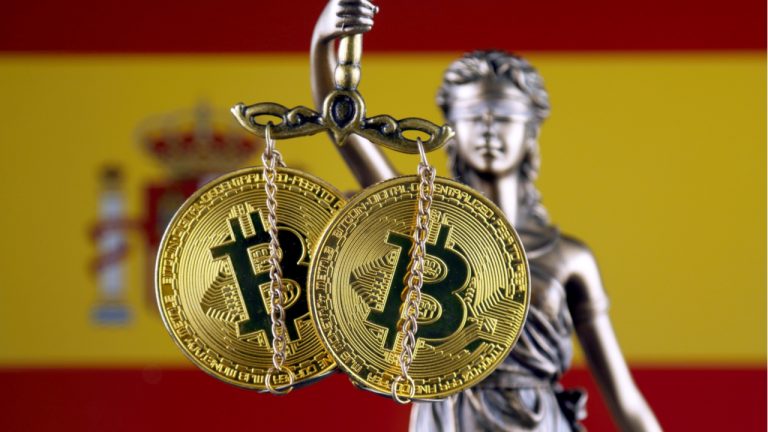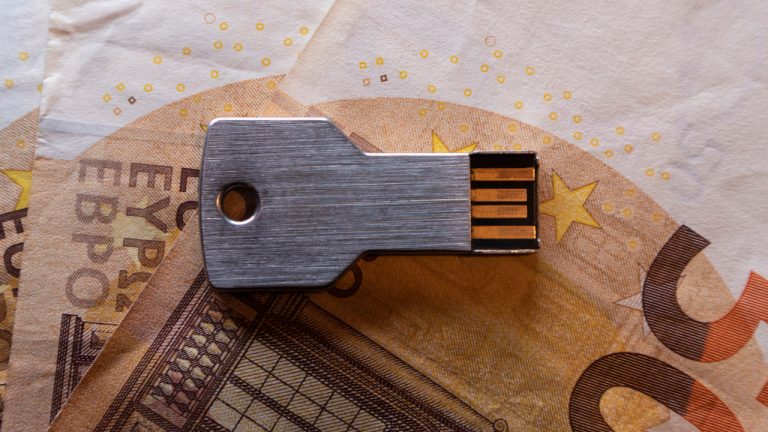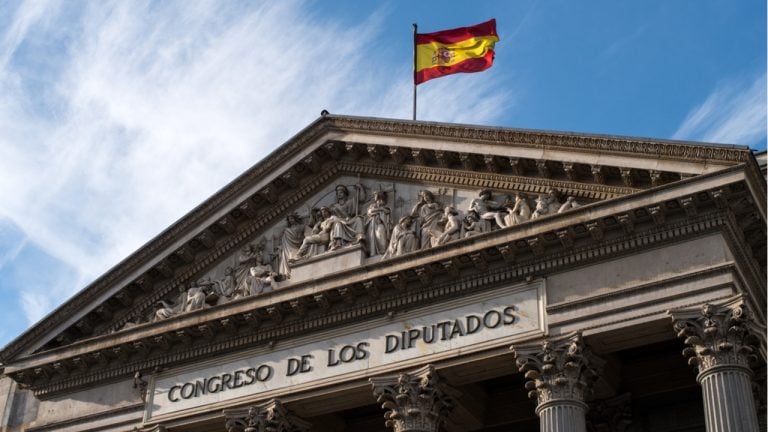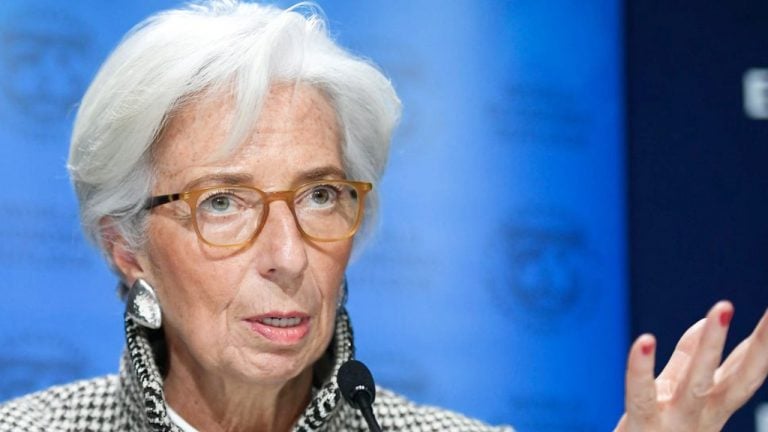 The U.S. Department of State’s undersecretary of state for political affairs, Victoria Nuland, has explained during a press conference that the U.S. has urged El Salvador to be responsible with the country’s new bitcoin law. Nuland told the press that the U.S. was taking a “tough look at Bitcoin” and that Salvadoran president Nayib Bukele […]
The U.S. Department of State’s undersecretary of state for political affairs, Victoria Nuland, has explained during a press conference that the U.S. has urged El Salvador to be responsible with the country’s new bitcoin law. Nuland told the press that the U.S. was taking a “tough look at Bitcoin” and that Salvadoran president Nayib Bukele […]
Spain’s oldest active political party is reportedly looking to create a public digital currency.
The Spanish Socialist Workers’ Party (PSOE), the governing political body in Spain, is backing a new national digital currency initiative.
PSOE, Spain’s oldest active party and the leading force in the Congress of Deputies, has introduced a non-law proposition to launch a national digital currency in response to the ongoing decline in cash usage, local news agency El Economista reported Monday.
The party noted that the proposition comes in response to the European Central Bank’s experiments with a digital euro. Carlos Conesa, general director of the financial innovation division at the Spanish Central Bank, recently said that “the decision to launch a project on the digital euro is very close.”
According to the proposal, a national digital currency would enable higher liquidity “In the event that a monetary expansion is necessary, it allows a more direct mechanism, by injecting liquidity directly into current accounts and thus transferring it immediately and without intermediaries to economic activity.”
The party went on to say that a Spanish digital currency “would end the ‘privilege’ of banks over money,” noting that the project would be achieved “without the nationalization of the banking system or the nationalization of credit.”
“At present, it is perfectly feasible that each individual can have his own account with his digital money directly at the central bank. A privilege, for the moment, restricted to banks,” the proposal reportedly reads.
Related: Digital euro could take four years, says ECB president Christine Lagarde
According to El Economista, the PSOE initially proposed creating a national digital currency in mid-June. The party urged the government to establish a dedicated group to evaluate digital currency's effect on the greater financial stability of the Spanish economy and the euro area as a whole.
While the European Central Bank takes its time to deliberate on the digital euro, some observers have begun to doubt the hypothetical currency's efficacy. Pablo Urbiola, an executive at BBVA, argued on Monday that it is not yet exactly clear what kind of customer demand the digital euro is supposed to meet.

The European Central Bank should rely on public-private cooperation for issuing a digital euro, an exec at BBVA’s digital regulation team said.
An executive at major Spanish bank Banco Bilbao Vizcaya Argentaria (BBVA) has raised concerns about the digital euro and questioned what customer demand it would meet.
Pablo Urbiola of BBVA’s digital regulation team has called on European financial authorities to carefully explore the possible issuance of a central bank digital currency (CBDC).
Urbiola said Friday at a European Banking Federation seminar that, despite the increasing need for a European CBDC, it is not yet exactly clear what kind of customer demand the digital euro is supposed to meet:
“Considering all the innovation that is taking place in the payments market, it is not clear which customer demands a digital euro could fulfil that may not be fulfilled by other initiatives.”
The executive emphasized that the European Central Bank should consider all the opportunities and risks of a digital euro, taking into account different design options. “It is essential that the general framework designed by the ECB is flexible enough, and that allows private players to develop business models in a competitive space,” Urbiola noted.
Urbiola said that the ECB wants to address the myriad challenges associated with the digital euro: “For instance, if a digital euro aims to respond to the decreasing use of cash, it should be designed as an electronic version of cash — that is, simple, easy to use, with basic functionality.” But if a digital euro aims to respond to the threat of foreign digital currencies, “it should be able to replicate some of the more advanced functionalities of these initiatives,” he noted.
Related: Banking giant BBVA debuts Bitcoin trading and custody for Swiss clients
The exec said that banks in Spain are prepared for the arrival of a digital euro, stating that BBVA has participated in preliminary trials involving the issuance of the ECB’s digital currency alongside 15 other major banks.
Urbiola’s comments come shortly after the ECB declared that the digital euro may be crucial in combating “artificial currencies” in cross-border payments. In early June, the ECB published its annual euro review, raising concerns over the rise of artificial currencies led by foreign tech giants, apparently referring to Facebook’s Diem project.
 The latest Mica (Europe’s Markets in Crypto-Assets Regulation) revision designates the CNMV and the Bank of Spain as the main cryptocurrency watchdogs in the country. The draft also stipulates that companies offering services in the EU will need to be based in a European country. The norm excludes NFTs, for now. Experts state the law […]
The latest Mica (Europe’s Markets in Crypto-Assets Regulation) revision designates the CNMV and the Bank of Spain as the main cryptocurrency watchdogs in the country. The draft also stipulates that companies offering services in the EU will need to be based in a European country. The norm excludes NFTs, for now. Experts state the law […] The European Data Protection Board (EDPB) has issued a call for EU institutions to uphold privacy when designing a digital version of the euro. The agency is ready to provide advice on data protection matters surrounding the project. Meanwhile, an ECB executive has vowed that the digital euro will protect users’ privacy. EDPB Insists Data […]
The European Data Protection Board (EDPB) has issued a call for EU institutions to uphold privacy when designing a digital version of the euro. The agency is ready to provide advice on data protection matters surrounding the project. Meanwhile, an ECB executive has vowed that the digital euro will protect users’ privacy. EDPB Insists Data […] A group of Spanish deputies filed a proposal that seeks to accelerate the implementation of a digital euro. The proposal, presented on June 8, asks for the creation of a group to study the implementation of a digital currency in the Eurozone. This study group, if created, would be aided by the Bank of Spain. […]
A group of Spanish deputies filed a proposal that seeks to accelerate the implementation of a digital euro. The proposal, presented on June 8, asks for the creation of a group to study the implementation of a digital currency in the Eurozone. This study group, if created, would be aided by the Bank of Spain. […]
Banks in smaller countries like Latvia, Estonia and Greece could be impacted harder by the digital euro, analysts said.
Analysts at the American multinational investment bank Morgan Stanley have estimated the likely changes in eurozone banks’ deposits should a digital euro be widely adopted.
According to the analysts, a European Union central bank digital currency (CBDC) could suck away 8% of customer deposits from eurozone banks, Reuters reports Wednesday. This share may be far higher in smaller countries like Latvia, Lithuania, Estonia, Slovakia, Slovenia and Greece, they said.
The analysts’ estimates were based on a “bear case” scenario where all euro area citizens above the age of 15 sent 3,000 euros ($3,637) into a digital euro wallet controlled by the European Central Bank. As previously reported, this amount could be a theoretical limit of total CBDC holdings by residents, according to ECB executive board member Fabio Panetta.
“This could theoretically reduce euro area total deposits, defined as households’ and non financial corporations’ deposits, by 873 billion euros, or 8%,” Morgan Stanley analysts said.
Related: Digital euro could take four years, says ECB president Christine Lagarde
Morgan Stanley also said that digital euro adoption could slightly increase the average loan-to-deposit ratio by eurozone banks, increasing the risk that banks may not have enough liquidity to cover unforeseen fund requirements. The average LDR would surge from 97% to 105%, the analysts estimated, noting that banks in aggregate would “hardly notice” the effect, as LDR previously spiked to 105% in late 2019 before the COVID-19 pandemic.
Many banks around the world have expressed concerns over central banks getting more power over the money supply by adopting a CBDC. Last week, a Bank of England discussion paper modeled a scenario where a fifth of all retail deposits in the United Kingdom was held in new forms of digital currency or a CBDC. “As a result of this potential outflow, commercial banks would have to adapt their balance sheets in response to maintain their current liquidity ratios,” the bank wrote.
 The president of the European Central Bank (ECB), Christine Lagarde, has shared her view on El Salvador making bitcoin legal tender. She confirmed that the central bank’s policy on bitcoin and other cryptocurrencies has not changed. ECB’s Lagarde Comments on El Salvador Making Bitcoin Legal Tender ECB President Christine Lagarde has shared her view last […]
The president of the European Central Bank (ECB), Christine Lagarde, has shared her view on El Salvador making bitcoin legal tender. She confirmed that the central bank’s policy on bitcoin and other cryptocurrencies has not changed. ECB’s Lagarde Comments on El Salvador Making Bitcoin Legal Tender ECB President Christine Lagarde has shared her view last […]
Greenpeace has said its facility for accepting Bitcoin donations will be scrapped as it is “no longer tenable” in light of the climate crisis.
“Proof of work is proof of burning,” is fast becoming the dominant view of Bitcoin (BTC) among those who are serious about tackling the climate crisis. The words are from a United Kingdom government representative for this year's COP26 UN climate talks, cited this week in the Financial Times.
The same article indicates that climate campaigning groups — who have, until now, been slow to take a firm line against Proof-of-Work cryptocurrencies — are catching up and becoming more aware of the climate risks involved. Greenpeace, which set up a facility for accepting Bitcoin donations back in 2014, is now planning to scrap the channel. The organization told reporters that, while the option has not in fact been widely used to date:
“As the amount of energy needed to run Bitcoin became clearer, this policy became no longer tenable.”
Much of the current awareness of Bitcoin's energy problem has undoubtedly been galvanized by Elon Musk's recent high-profile intervention when the Tesla CEO announced the company would no longer be accepting BTC as payment for vehicles due to concerns about the high energy consumption of Bitcoin mining.
While Musk's decision had a dramatic and immediate impact on the cryptocurrency markets, sparking a sharp decrease in Bitcoin's price, the shift towards Bitcoin's reputation as a “dirty currency” has long been in the making. Longstanding concerns about the currency's high energy consumption are increasingly gaining traction against the backdrop of a new consensus in high finance that is increasingly focused on centering sustainable investing strategies.
Critics of green measures set in motion by the European Union and others — which involve an attempt to escort capital into sustainable development assets — point to the ample room for “greenwashing” that current strategies underwrite. Nation-states are increasingly stepping in to “derisk“ development assets i.e. to guarantee profits against demand-side, political and climate-driven investment shocks, while the world's largest asset managers are able to co-opt and capitalize on the green agenda for their own ends.
As the political battle over green finance continues to be waged, many political and financial actors are, nonetheless, increasingly taking the line that Proof-of-Work cryptocurrencies are a “dirty business.” The European Central Bank's recent Financial Stability Review has highlighted the “exorbitant carbon footprint” of crypto-assets as grounds for concern, while the Bank of Italy's comparison of its Target Instant Payment Settlement with Bitcoin highlighted that the former already had a carbon footprint that was 40,000 times smaller than Bitcoin's by 2019.
Outliers persist: the increasing, potentially lucrative involvement of megabanks such as Goldman Sachs, Morgan Stanley and Citigroup in the crypto industry reveals the true priorities behind these actors' lip service to meeting sustainable finance goals.
Some analysts continue to argue that where crypto mining is fueled by hydroelectric power and other clean sources, climate risks are less of an immediate concern. While over 70% of BTC mining does use some form of clean energy, renewables nonetheless account for under 40% of the total energy used in the Bitcoin sector. Moreover, off-grid and informal mining practices make the figure hard to quantify and keep tabs on.
Cointelegraph reached out to Greenpeace for comment and will update this article should they respond.